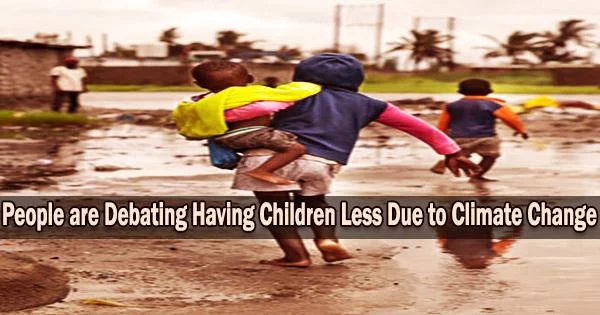A growing number of people are hesitant to welcome a child into a planet that will, in the upcoming decades, be wracked by climate change.
This week, the United Nations issued a “code red for humanity” as the world’s leading climate scientists delivered their starkest warning yet about the deepening climate emergency. In its report released on Monday, the Intergovernmental Panel on Climate Change predicted that global temperatures will rise by 1.5 degrees Celsius over the next two decades, exceeding a major goal of the historic Paris Agreement, which is thought to be of utmost importance in lowering the risk of a climate catastrophe.
More and more people are choosing not to have children due to scientists’ increasingly pessimistic predictions for the state of the earth.
Analysts at Morgan Stanley said in a note to investors last month that the “movement to not have children owing to fears over climate change is growing and impacting fertility rates quicker than any preceding trend in the field of fertility decline.”
They cited studies, academic research, and Google data to back up their claim that climate change is hastening the drop in fertility rates both directly and indirectly.
While a study of 18,000 couples in China last year revealed that climate change, and particulate pollution in particular, was associated with a 20% increased likelihood of infertility, UCLA researchers found that the number of births in the United States decreased in the nine months following an extreme heat event.
Some people decide against starting families because of concern that doing so may accelerate global warming.
“Having a child is 7-times worse for the climate in CO2 emissions annually than the next 10 most discussed mitigants that individuals can do,” analysts at Morgan Stanley said.
A Swedish study, published in IOPscience in 2017, found that having one fewer child per family could save approximately 58.6 metric tons of carbon each year in developed countries.
Reducing the population, according to Kimberley Nicholas, one of the study’s authors, is not the best method to address the climate challenge. “It is true that more people will consume more resources and cause more greenhouse gas emissions,” she said. “But that’s not really the relevant timeframe for actually stabilizing the climate, given that we have this decade to cut emissions in half.”
Enduring extreme weather
Others worry about the potentially harmful effects of the extreme weather occurrences their children might experience. For instance, crops might not succeed in some regions of the planet.
Currently residing in Dubai, United Arab Emirates, 35-year-old Daniel is a Briton who has been married to his spouse for about 12 years. At the beginning of their relationship, they were amenable to the notion of having kids, but now they’re less interested.
“Over the last few years, the climate has definitely been a major contributor to us not wanting children,” Daniel told CNBC, requesting that his surname be left out of the story over fears that he may be targeted online by people who disagree with him.
The pair has been seeking for ways to dramatically reduce their carbon footprint because they enjoy traveling and depend on air conditioning for the most of the year. “We thought about it quite a lot and quickly realized that adding another human being to the world would have a huge environmental impact,” Daniel said.
Prince Harry said in 2019 that he and his wife Meghan were planning to have a maximum of two children, citing environmental concerns.
The issue of bringing more people into a warming world is being discussed by people on social media with big followings.
In a 2019 Instagram live stream to her 1.5 million followers, 31-year-old New York Rep. Alexandria Ocasio-Cortez said: “Basically, there’s a scientific consensus that the lives of children are going to be very difficult. And it does lead, I think, young people to have a legitimate question: Is it okay to still have children?”
‘Existential angst’
Jessica Combes, a 39-year-old English teacher, told CNBC: “I refuse to bring children into the burning hellscape we call a planet.”
Combes said she has always been unsure about having children of her own. “Now, as I look at the state of the economy, shoddy global healthcare and climate change, I just feel like all my trepidation was well justified,” she said.
Some of those who already have children are also worried. Thom James, 39, a managing partner at advertising and public relations firm Havas U.K., told CNBC: “I had a major depressive episode last year based on existential angst over the world my children would be growing up in.”
James has two girls aged three and six. “Worrying about their future is a frequent trigger for me,” he said. “I’m constantly thinking about when it’s going to be appropriate to dissuade them from having children of their own, as I think we’re really past the point of no return.”
Of course, humanity would eventually vanish if everyone stopped having children. Anti-natalists on the fringe have this viewpoint, but it is not shared by the majority of people.
In fact, a lot of individuals believe that having children is a basic human right and that it can make families happier and more joyful.
Instead of population growth, the climate emergency is caused by an increase in greenhouse gas emissions from burning fossil fuels.
The IPCC’s report warned that some of the climate changes researchers observed such as continued sea level rise were projected to be “irreversible over hundreds to thousands of years.”
The report also reaffirmed the urgent need for “strong and sustained” reductions of carbon emissions and other greenhouses gases to limit climate change.
U.N. Secretary-General, António Guterres said the findings were “a code red for humanity.”
He added: “This report must sound a death knell for coal and fossil fuels, before they destroy our planet.”
Even if authorities openly accept the need to move toward a low-carbon society, it is anticipated that over the next few decades, global reliance on fossil fuels will only worsen.
















